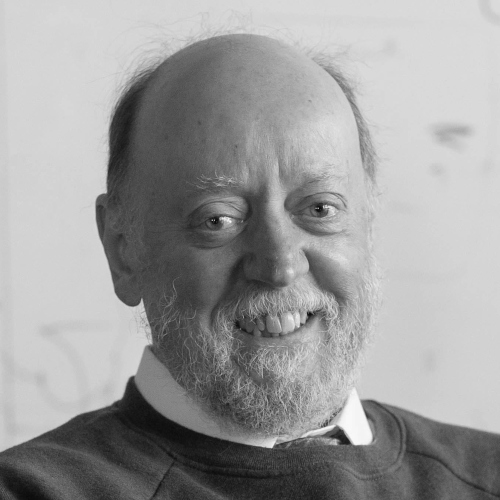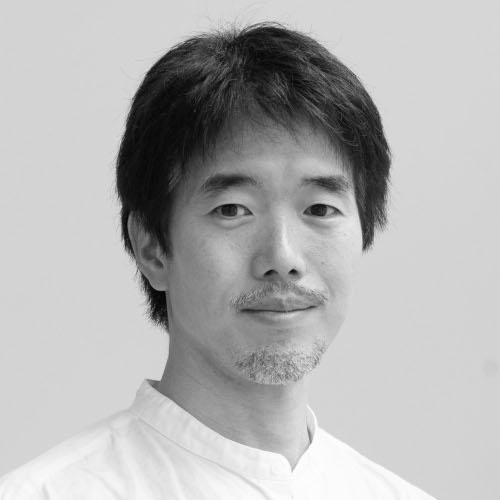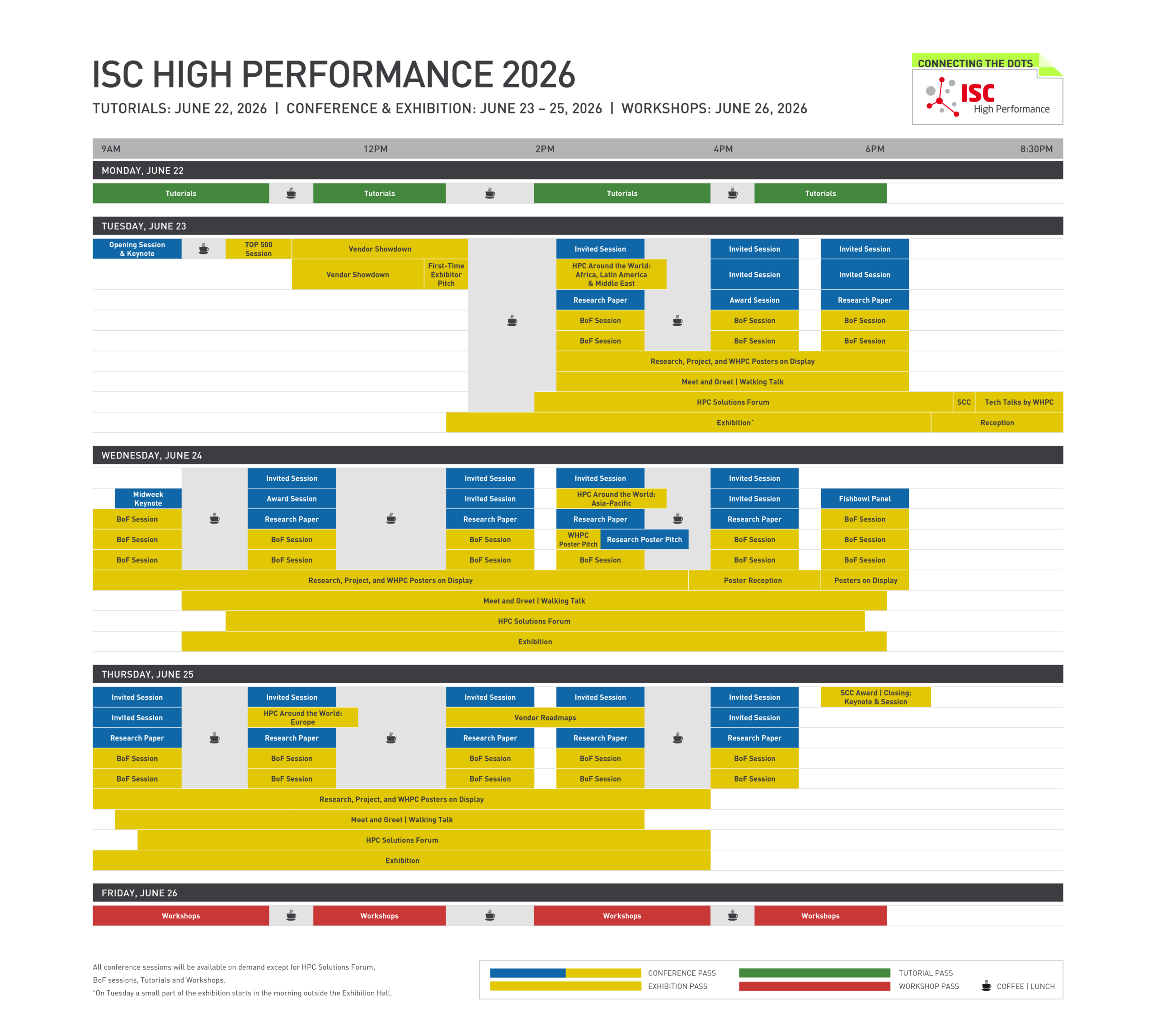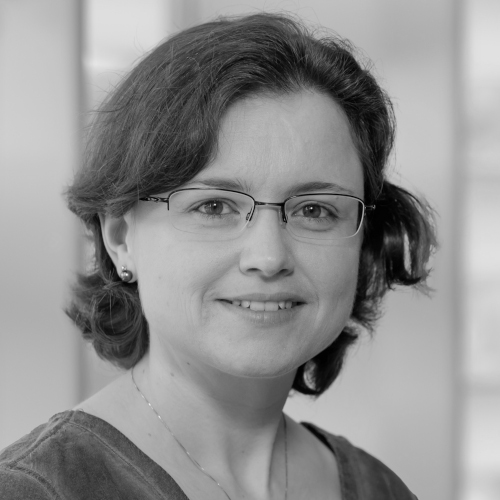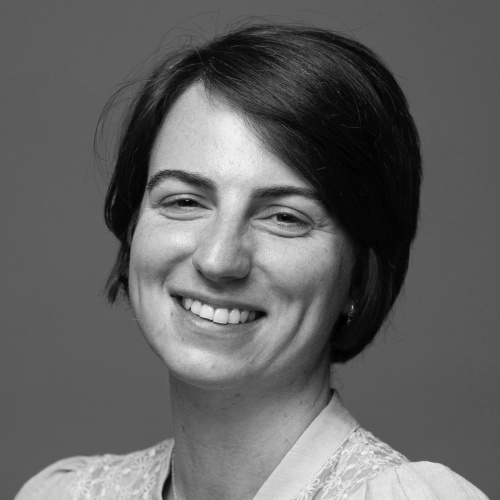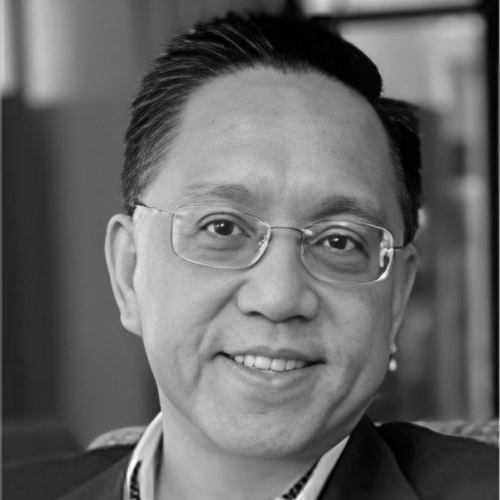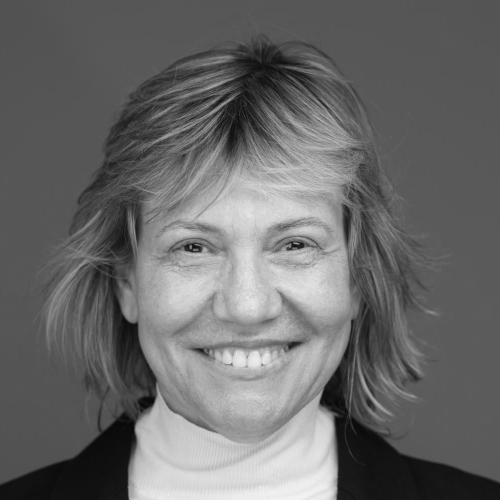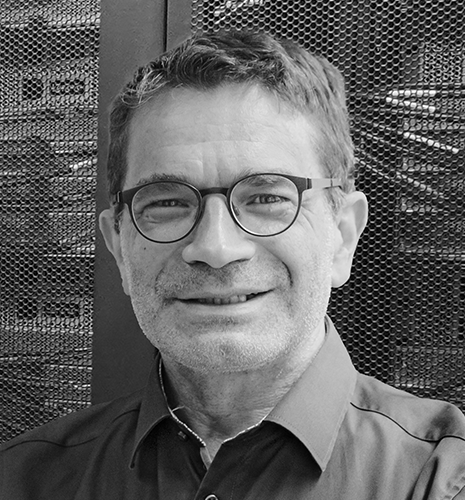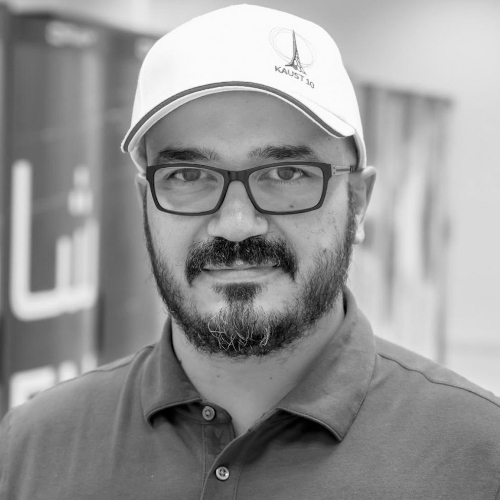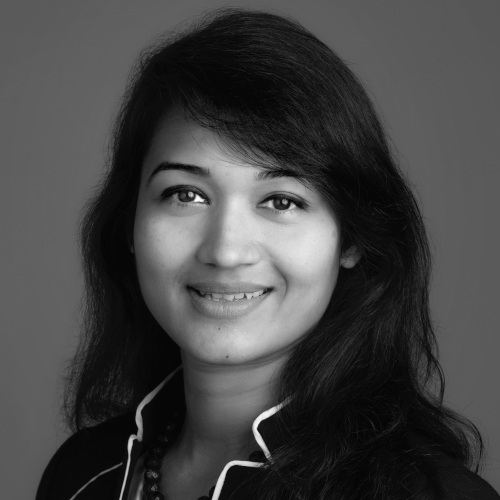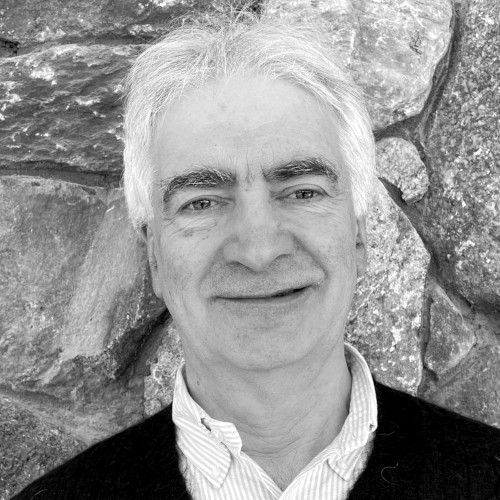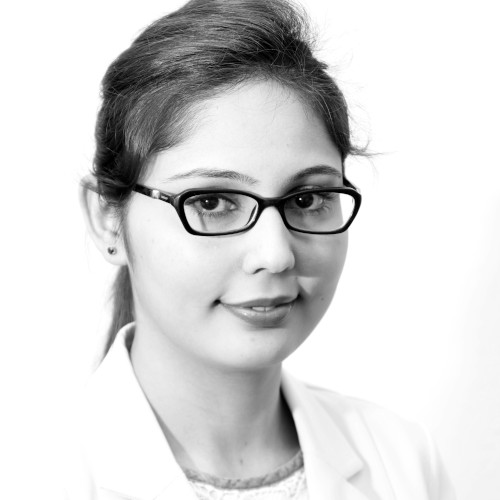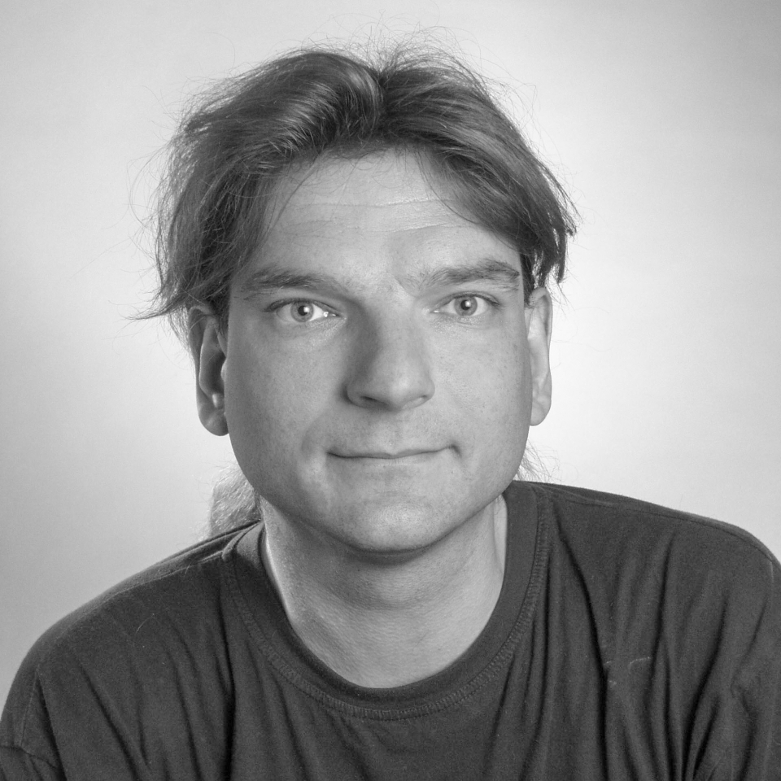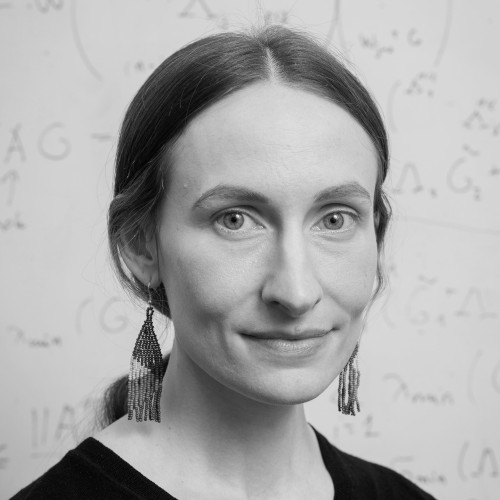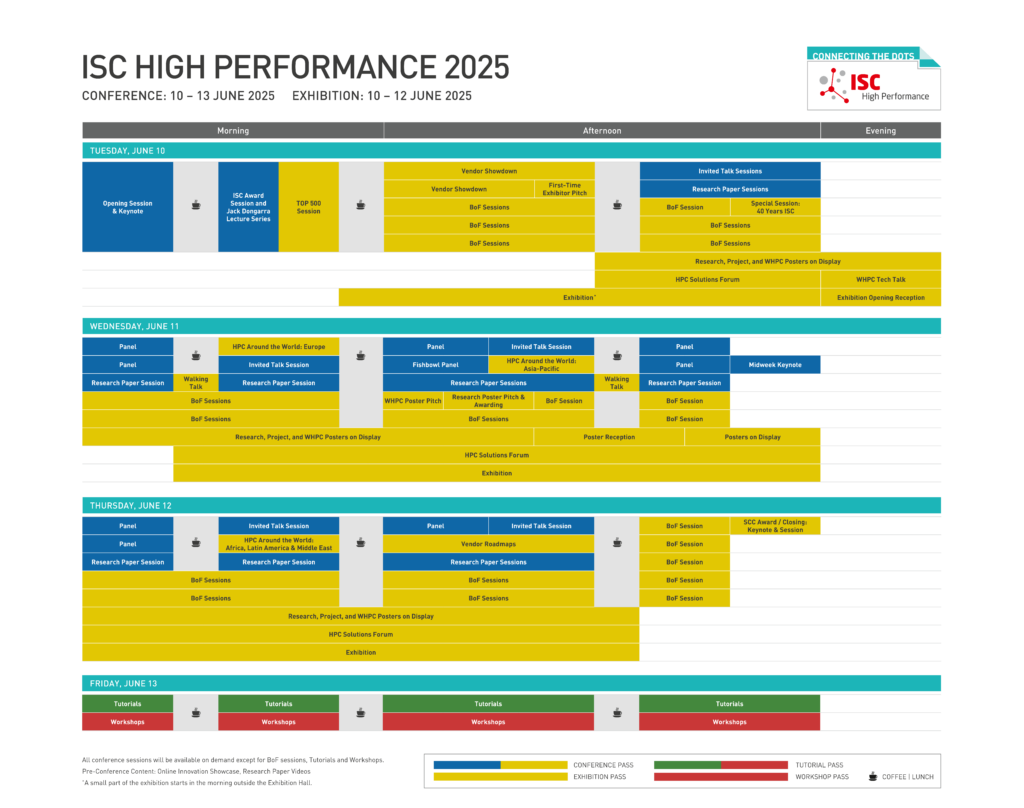CONFERENCE
Program
WHAT THE PROGRAM OFFERS
The ISC Conference Program brings together international speakers and offers diverse perspectives from scientists, researchers, and industry leaders. It covers key topics in high performance computing, artificial intelligence and quantum computing. The program is presented in various formats to maximize knowledge exchange and community engagement.
KEYNOTES
The three ISC Keynote presentations offer unique insights each day, featuring renowned experts in HPC, AI and IT.
The Midweek Keynote will be announced soon!
OPENING KEYNOTE
HPC: A Heterogeneous Future
High performance computing (HPC) has long been driven by relentless demand for more computational power, enabling breakthroughs across science and engineering. For decades, Moore’s Law and Dennard Scaling provided a predictable path for performance growth but these trends have slowed dramatically, exposing fundamental challenges that go beyond transistor density. Issues such as data movement, memory bandwidth, and energy efficiency have become dominant bottlenecks, making incremental improvements in raw computational power insufficient. GPUs, while powerful, are not a fundamental departure from traditional architectures. As a result the need for transformative innovation has never been greater.
READ FULL ABSTRACT
The post-Moore era calls for a paradigm shift that pushes algorithmic advances, but also novel hardware and software approaches. Emerging technologies – quantum computing, neuromorphic architectures, photonics, and others – offer promising acceleration capabilities, but each introduces its own ecosystem, challenges and complexity. To harness these innovations effectively, HPC must evolve toward integrated, heterogeneous environments built on top of unified software stacks that ensure programmability, portability, and accessibility for domain scientists.
This keynote will showcase examples of emerging technologies and their integration into the HPC ecosystem. A concrete case will highlight quantum acceleration through an HPC-QC software stack and hybrid workflows. Building on this, the talk will outline strategies for creating a unified, heterogeneous environment that turns diversity in architectures – from quantum to neuromorphic – into a strength rather than a barrier.
ABOUT MARTIN SCHULZ
Martin Schulz is a Full Professor and Chair of Computer Architecture and Parallel Systems at the Technical University of Munich (TUM) and serves on the board of directors at the Leibniz Supercomputing Centre (LRZ). His research focuses on high performance computing, including parallel and distributed architectures, performance modeling and analysis, programming paradigms and tools, and power-aware computing. He is also actively exploring emerging technologies, including quantum computing and its integration into HPC systems.
CLOSING KEYNOTE
HPC IN TRANSITION
High performance computing (HPC) is entering a decisive transition driven by forces that are largely external to traditional scientific HPC. The economics of artificial intelligence (AI) and hyperscale cloud now shape leading-edge silicon, system architectures, and software ecosystems, while energy and data movement have become the dominant constraints on performance, facility design, and long-term sustainability. This talk examines how these dynamics shift HPC’s center of gravity from a primarily FP64, node-centric worldview toward accelerator-heavy, rack-scale, and workflow-defined systems.
READ FULL ABSTRACT
We argue that the next era of scientific capability will be measured less by peak floating-point rates and more by time-energy-fidelity trade-offs across end-to-end pipelines. The most plausible path to “effective zettascale” is not brute-force FP64, but certified mixed-precision algorithms, communication-avoiding methods, AI-augmented reduced-order models, and hybrid AI+simulation workflows with rigorous error control and uncertainty quantification. We also outline an emerging reference architecture for platforms comprising integrated simulation, AI, and data/workflow partitions, linked and coordinated across multiple separate resources with secure cloud resources and instruments.
ABOUT JACK DONGARRA
Jack Dongarra specializes in numerical algorithms in linear algebra, parallel computing, the use of advanced computer architectures, programming methodology, and tools for parallel computers. He holds appointments at the University of Manchester and the University of Tennessee, where he founded the Innovative Computing Laboratory. He is a Fellow of the ISC, AAAS, ACM, IEEE, and SIAM; a foreign member of the British Royal Society and a member of the U.S. National Academy of Sciences and the U.S. National Academy of Engineering. He received the 2021 ACM A.M. Turing Award for his pioneering contributions to numerical algorithms and software that have driven decades of extraordinary progress in computing performance and applications.
TOPICS
TOPICS
The program is built around topic areas that reflect the key challenges and innovations in HPC, AI, and quantum computing. They provide the framework for both invited and contributed sessions.
Click on a topic area to view details.
System Architecture & Hardware Components
- Composable Disaggregated Infrastructure
- Data Center Infrastructure and Cooling
- Emerging Computing Technologies
- Energy Efficiency and Sustainability
- Extreme-scale Systems
- Heterogeneous System Architectures
- Memory Technologies and Hierarchies
- Networking and Interconnects
- Post Moore Computing
- Storage Technologies and Architectures
Programming Environments & System Software
- Compiler and Tools for Parallel Programming
- Cybersecurity in HPC and AI
- Energy Management
- File Systems
- HPC in the Cloud and HPC Containers
- Parallel Programming Languages
- Resource Management and Scheduling
- Runtime Systems for HPC
- System and Performance Monitoring
Algorithms & Performance
- Mixed Precision
- Novel Algorithms
- Optimizing for Energy and Performance
- Parallel Numerical Algorithms
- Performance and Resource Modeling
- Performance Measurement
- Performance Tools and Simulators
Applications & Use Cases
- Application Workflows for Discovery
- Bioinformatics and Life Sciences
- Chemistry and Materials Science
- Earth, Climate and Weather Modeling
- Engineering
- Geosciences
- Industrial Use Cases of HPC, ML and QC
- Physics
- Renewable Energy
- Visualization and Virtual Reality
Machine Learning & AI
- AI Applications powered by HPC Technologies
- AI Factories
- Digital Twins and ML
- High-Performance Data Analytics
- HPC Simulations enhanced by Machine Learning
- HW and SW Design for Scalable Machine Learning
- Large Language Models and Generative AI in HPC
- ML Model Optimization
- ML Systems and Frameworks
- Sovereignty in AI
Quantum Computing
- Integration of Quantum Computing and HPC
- Quantum Computing Basics and Theory
- Quantum Computing Technologies and Architectures
- Quantum Computing Use Cases
- Quantum Error Correction
- Quantum Machine Learning
- Quantum Program Development and Optimization
- Simulating Quantum Systems
Community & HPC
- Community Engagement
- Development of HPC Skills
- Diversity and Inclusion
- Education and Training
PROGRAM CHAIR & DEPUTY
“In 2026, ISC will continue to connect the dots: uniting HPC, AI, quantum and cloud for groundbreaking research from engineering to life sciences, all while championing sustainability as the cornerstone of future computing power.”
Rosa M. Badia
ABOUT ROSA M. BADIA
Rosa M. Badia holds a PhD in Computer Science (1994) from the Technical University of Catalonia (UPC). She has recently been appointed director of the HPC software research area and she is the manager of the Workflows and Distributed Computing research group, both roles at the Barcelona Supercomputing Center (BSC, Spain).
Her research has contributed to parallel programming models for multicore and distributed computing. Recent contributions have focused in the area of the digital continuum, proposing new programming environemnts and software environment for edge-to-cloud, as well as for the support of hybrid quantum-classic workflows. The research is integrated in PyCOMPSs/COMPSs, a parallel task-based programming distributed computing framework, and its application to developing large heterogeneous workflows that combine HPC, Big Data, and Machine Learning. The group is also doing research around the dislib, a parallel machine learning library parallelized with PyCOMPSs. Dr Badia has published more than 200 papers on her research topics in international conferences and journals. She has been very active in projects funded by the European Commission and in contracts with industry. In particular, she was the PI of the EuroHPC JU project eFlows4HPC. She is the chair of the ACM Europe Council since beginning of 2022, a member of the EuroHPC JU RIAG and a member of HiPEAC Network of Excellence.
She received the Euro-Par Achievement Award 2019 for her contributions to parallel processing, the DonaTIC award, category Academia/Researcher in 2019 and the HPDC Achievement Award 2021 for her innovations in parallel task-based programming models, workflow applications and systems, and leadership in the high performance computing research community. Since 2023 she is a member of the Institut d’Estudis Catalans (Catalan academy).
ABOUT RIO YOKOTA
Rio Yokota is a Professor at the Supercomputing Research Center, Institute of Integrated Research, Institute of Science Tokyo. He also leads the AI for Science Foundation Model Research Team at RIKEN Center for Computational Science. His research interests lie at the intersection of high performance computing, machine learning, and linear algebra. He has been optimizing algorithms on GPUs since 2007, and was part of a team that received the Gordon Bell prize in 2009 using the first GPU supercomputer. More recently, he has been leading distributed training efforts on Japanese supercomputers such as ABCI, TSUBAME, and Fugaku. He is the co-developer of the Japanese LLM Swallow, and LLM-jp. He is also involved in the organization of multinational collaborations such as ADAC and TPC.
A WIDE RANGE OF PROGRAM ELEMENTS
From keynotes to tutorials, the ISC Conference Program brings together academia, industry, and government.
INVITED PROGRAM
Explores HPC and adjacent technology trends, drawing insights from researchers worldwide.
-
Keynotes
Notable speakers on trends and future outlook
→ View Keynote speakers -
Panels
Direct interaction with the audience -
Invited Talk
Insights from "hand-picked" experts -
HPC Around the World
Regional developments and emerging markets- Europe
- Africa, Latin America & Middle East
- Asia-Pacific
-
Walking Talks
Guided exhibition tours by tech experts
CONTRIBUTED PROGRAM
Submissions from researchers at all career levels create a diverse and rewarding program for the community.
-
Research Paper
Presents original work to peers
→ Learn more -
Research Poster
Showcases the latest results and innovations
→ Learn more -
Project Poster
Shares ongoing collaborative projects
→ Learn more -
Women in HPC Poster
Showcases research by early-career women
→ Learn more -
Birds of a Feather
Informal discussions on niche topics
→ Learn more -
Tutorials
Comprehensive hands-on introductions
→ Learn more -
Workshops
Expert-led sessions with group work
→ Learn more→ Accepted Workshops
VENDOR PROGRAM
Commercial organizations showcase their offerings and strategies, providing users with insight into current and future solutions.
-
Vendor Roadmaps
Milestones and future directions -
Vendor Showdown
Product demos and expert Q&A -
HPC Solutions Forum
Strategies and technological advances -
First-Time Exhibitor Pitch
New exhibitors in one minute
STUDENT PROGRAM
-
Student Volunteer Program
Volunteers support the conference and receive free access to tutorials, sessions, workshops, the exhibition, and selected evening events.
→ Learn more -
Student Cluster Competition
International student teams design and run cluster systems in real time, competing for the highest performance while demonstrating innovation and teamwork.
→ Learn more
PROGRAM AT A GLANCE
The Invited Program Committee (IPC) ensures that all relevant topic areas in HPC systems and applications are addressed at ISC 2025.
ISC 2025 KEYNOTE SPEAKERS
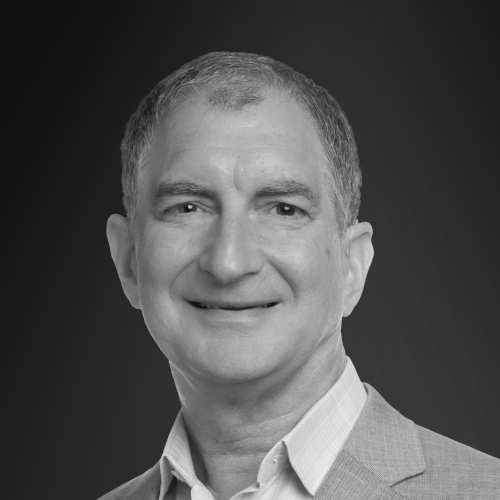
Opening Keynote
MARK PAPERMASTER
AMD Chief Technology Officer & Executive Vice President, USA

Midweek Keynote
BJORN STEVENS
Director of Climate Physics Department, Max Planck Institute for Meteorology Hamburg, Germany

Closing Keynote
YUTONG LU
Director, National Supercomputing Center, Guangzhou & Shenzhen, China
HELP SHAPE THE INVITED PROGRAM!
ISC encourages the community to take part in shaping the Invited Program. Share your nominations for speakers, panelists and chairs, especially talented early-career individuals, including women and researchers from underrepresented regions, who deserve to be recognized on a global stage.
AWARDS AT ISC 2026
ISC High Performance bestows awards annually to recognize research excellence by individuals and research groups from the global HPC communities.

JACK DONGARRA EARLY CAREER AWARD
An annual award honoring outstanding early-career contributions in HPC, commemorating Professor Jack Dongarra.
The award includes a certificate of recognition and a cash prize of € 5,000.

HANS MEUER AWARD
Recognizing the best research paper at ISC, the award honors Dr. Hans Meuer, former ISC chair and co-founder of the TOP500 project.
The Award includes a certificate and a cash prize of € 3,000.
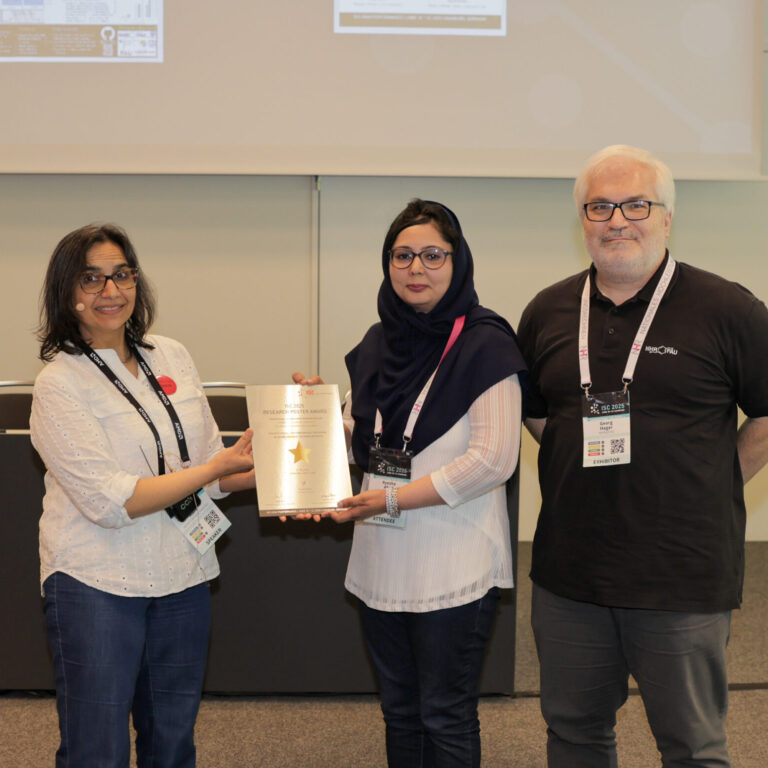
RESEARCH POSTER AWARD
Recognizes the most outstanding research posters presented at ISC.
The award includes a cash prize of € 500 (first place), € 300 (second place) and € 200 (third place).
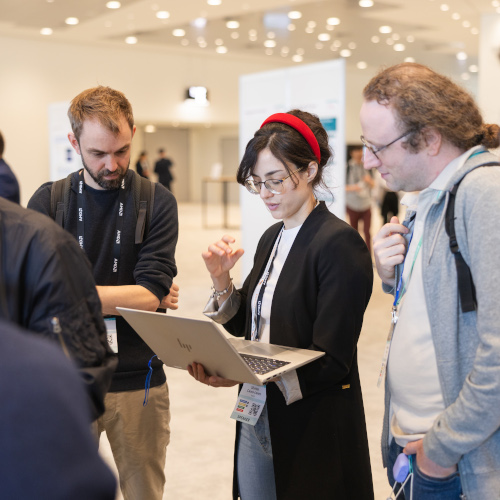
BEST STUDENT PAPER AWARD
Honors the most outstanding student paper presented at ISC.
LAST YEAR'S WINNERS
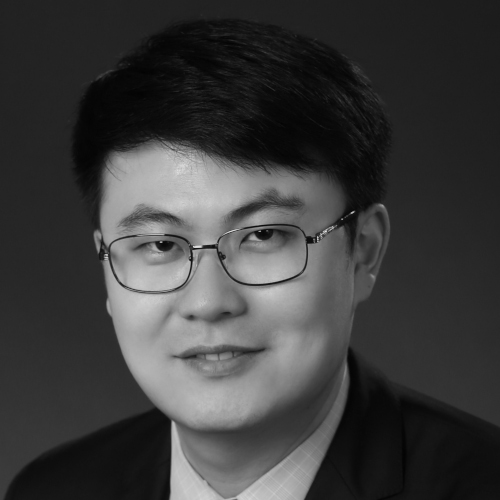
JACK DONGARRA EARLY CAREER AWARD
Dr. Lin Gan of Tsinghua University has been selected as the recipient of the ISC 2025 Jack Dongarra Early Career Award.
The award committee recognized his exceptional contributions to developing scalable algorithms, optimizing performance, and pioneering FPGA-based frameworks for acceleration.
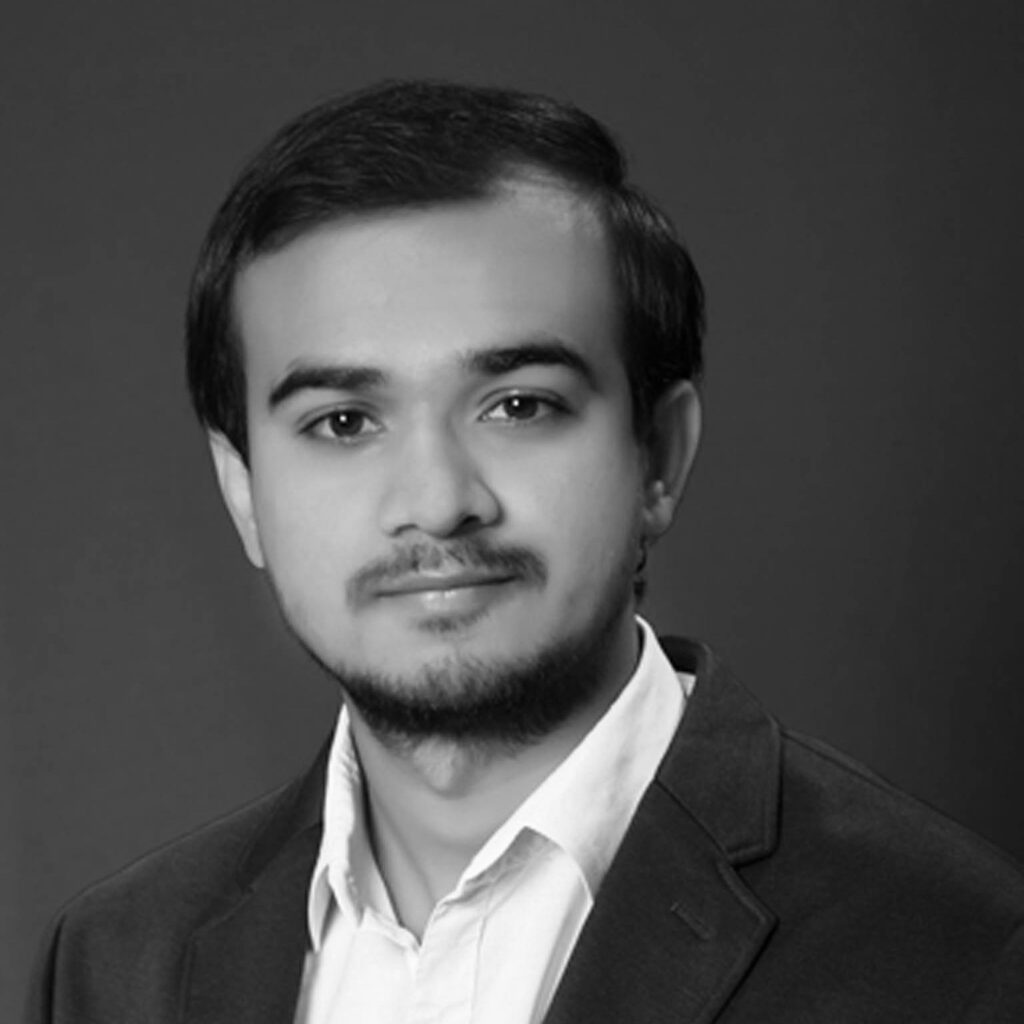
HANS MEUER AWARD
The paper selected as the winner of the ISC 2025 Hans Meuer Award is:
Towards a Unified Architectural Representation in HPCQC: Extending sys-sage for Quantum Technologies.
Authored by Durganshu Mishra, Stepan Vanecek, Jorge Echavarria, Xiaolong Deng, Burak Mete, Laura Schulz and Martin Schulz (Technical University Munich and Leibniz Supercomputing Center)
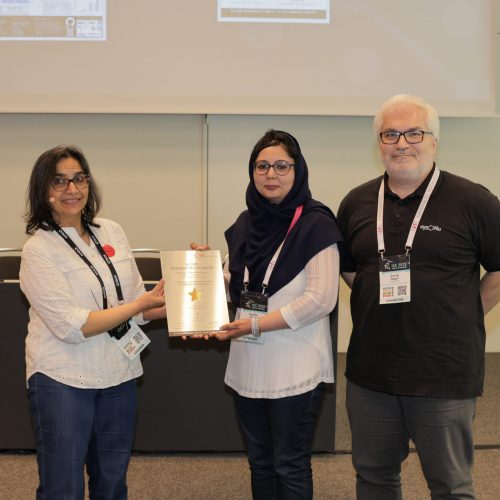

RESEARCH POSTER AWARD
The winners of the research poster awards are:
- 1st place:
DisCostiC: Digital Twin Performance Simulations Unlocking Hardware-Software Interplay
Authored by Ayesha Afzal, Georg Hager, Gerhard Wellein (Friedrich-Alexander-University Erlangen-Nuremberg (FAU), Germany)
- 2nd place:
The Art of Process Pinning: Turning Chaos into Core Harmony
Authored by Thomas Breuer, Filipe Guimarães, Wolfgang Frings, Jens Henrick Göbbert, Carina Himmels, Chrysovalantis Paschoulas (Forschungszentrum Jülich, Germany)
- 2nd place:
ZeroSum: User Space Utility for Monitoring Hardware and Software Resources for HPC
Authored by Kevin Huck and Allen Malony (University of Oregon, USA)
INVITED PROGRAM COMMITTEE
The Invited Program Committee (IPC) ensures that all relevant topic areas in HPC systems and applications are addressed at ISC 2026. The IPC is supported by Program Chair Rosa M. Badia (BSC, Spain), Program Deputy Chair Rio Yokota (Institute of Science Tokyo, Japan), and the ISC Program Team.

HPC Around the World (Europe)
CONTRIBUTED PROGRAM CHAIRS
The Contributed Program Chairs are the experts behind ISC 2026’s Contributed Program, fostering interdisciplinary understanding and enabling a productive technical exchange for the community.
STEERING COMMITTEE
The ISC 2026 Steering Committee provides guidance on the conference program and helps enhance the visibility, recognition, and growth of ISC within industry, research, and academia.
VIEW ALL MEMBERS
- Hartwig Anzt, Technical University of Munich, Germany (Tutorials Chair)
- Rosa M. Badia, Barcelona Supercomputing Center, Spain (Program Chair)
- Frank Baetke, European Open File Systems Association, Germany (ISC Fellow)
- Prasanna Balaprakash, Stealth AI Startup, USA (Invited Program Committee Topic Area Chair)
- Grey Ballard, Wake Forest University, USA (Proceedings Deputy Chair)
- Gianfranco Bilardi, University of Padova, Italy (Project Posters Chair)
- Serge Bogaerts, PRACE, Belgium
- Francieli Zanon Boito, Université de Bordeaux, France (Workshops Deputy Chair)
- Ron Brightwell, Sandia National Laboratories, USA (Invited Program Committee Topic Area Chair)
- Erin Carson, Charles University, Czech Republic (Proceedings Chair)
- Ewa Deelman, University of Southern California, USA (Project Posters Deputy Chair)
- Jack Dongarra, University of Tennessee, USA (ISC Fellow)
- Horst Gietl, Germany (ISC Fellow)
- Pauline Gounaud, EuroHPC Joint Undertaking, Luxemburg
- Alexander Heinlein, Delft University of Technology, The Netherlands (Tutorials Deputy Chair)
- Terence Hung, NSCC Singapore, Singapore (HPC Around the World Chair)
- Tanzima Islam, Texas State University, USA (Research Posters Chair)
- Hatem Ltaief, KAUST, Saudi Arabia (Research Papers Chair)
- Yutong Lu, Sun Yat-Sen University East Campus, China (ISC Fellow)
- Thomas Ludwig, Universität Hamburg & DKRZ, Germany (ISC Fellow)
- Satoshi Matsuoka, Riken Center for Computational Science, Japan (ISC Fellow)
- Sabine Mehr, GENCI, France (Invited Program Committee Topic Area Chair)
- Kathryn Mohror, Lawrence Livermore National Laboratory, USA (Invited Program Committee Topic Area Chair)
- Wolfgang Nagel, Technische Universität Dresden, Germany (ISC Fellow)
- Francesca Palumbo, University of Cagliari, Italy (BoF Deputy Chair)
- Manish Parashar, University of Utah, USA (Invited Program Committee Topic Area Chair)
- Arnab K. Paul, Birla Institute of Technology and Science, India (Workshops Chair)
- Horst Simon, ADIA Lab, Abu Dhabi (ISC Fellow)
- Estela Suarez, Juelich Supercomputing Center, Germany (Invited Program Committee Topic Area Chair)
- Carla Osthoff, Laboratório Nacional de Computação Científica, Brazil (HPC Around the World Chair)
- Thomas Sterling, Indiana University, USA (ISC Fellow)
- Erich Strohmaier, USA (ISC Fellow)
- Carsten Trinitis, Technical University of Munich, Germany (BoF Chair)
- Richard Vuduc, Georgia Institute of Technology, USA (Research Paper Deputy Chair)
- Gerhard Wellein, Friedrich-Alexander-Universität Erlangen-Nürnberg (FAU), Germany (HPC Around the World Co-Chair)
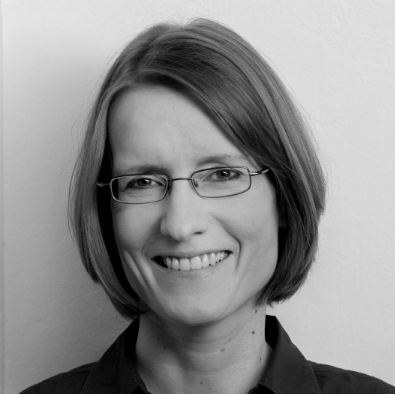

Contact
MS. TANJA GRÜNTER
Conference Program Manager
Invited Program
Ms. MAREILE GRÜN
Conference Program Coordinator
Vendor Program
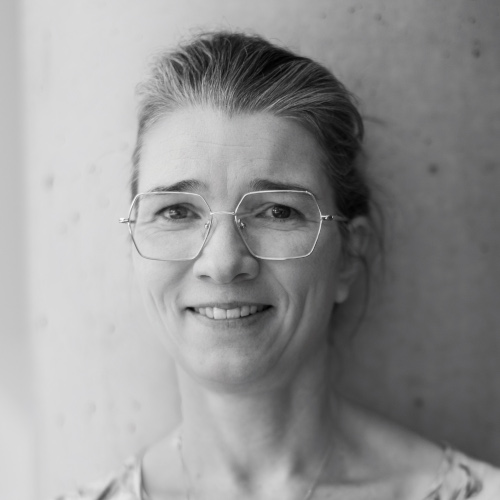
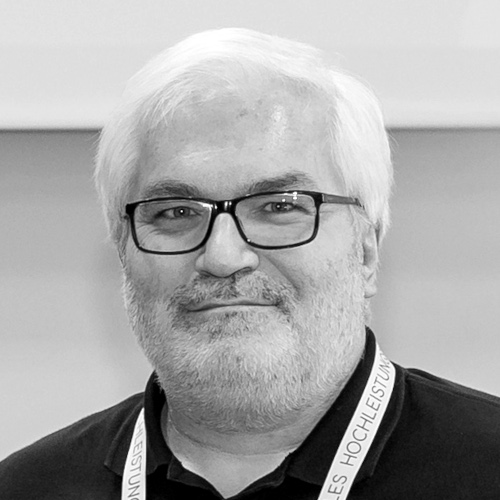
MS. ISABEL GRÄBNER
Conference Program Manager
Contributed Program
MR. GEORG HAGER
Contributed Program Advisor
ISC 2024 WORKSHOP PROCEEDINGS
The ISC 2024 Workshop Proceedings are available in Springer’s Lecture Notes in Computer Science (LNCS). Click below to explore the papers and gain valuable insights.
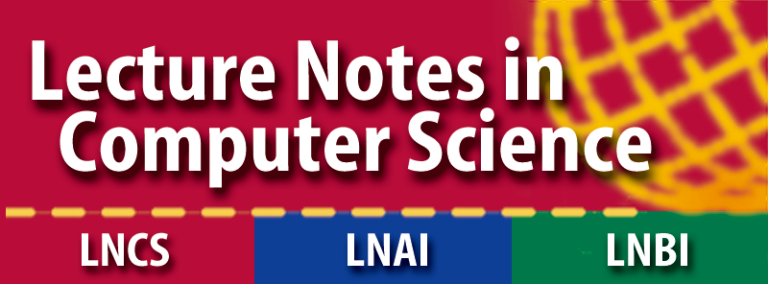
INVITED PROGRAM
The ISC Invited Program explores the developments and trends in HPC and adjacent technologies to allow users and vendors to understand how these technologies are coming together. Attendees can look forward to a good selection of topics and speakers consisting of senior and junior researchers from various geographies and research domains.
KEYNOTES

OPENING KEYNOTE
Tuesday, June 10, 9:15-10:15 am
HPC and AI: A Path Towards Sustainable Innovation
High performance computing (HPC) and artificial intelligence (AI) are intrinsically linked by their hardware, software, and the nature of their problem sets. They are also linked by their need to deliver highly energy-efficient computing at scale. As a consequence, HPC and AI are on a path toward convergence that will reshape much of the industry in the years ahead. The newer systems, such as Frontier and El Capitan in the United States and LUMI and HPC6 in Europe, are already paving the way by pushing the boundaries of performance while emphasizing energy efficiency.
In the opening keynote, AMD Chief Technology Officer and Executive Vice President Mark Papermaster will present his company’s vision of how the HPC-AI convergence will play out, and how energy efficiency can be enhanced through advancements in silicon, system design, software, and other technologies. He will also discuss the importance of collaboration and the need for an open ecosystem.
During his talk, Mark will invite guest speaker Scott Atchley, CTO for the National Center for Computational Science and the Oak Ridge Leadership Computing Facility, to join him on stage. Scott will share use cases that demonstrate the impact of the Frontier supercomputer and his perspective on future computing requirements.

Director of Climate Physics Department, Max Planck Institute for Meteorology Hamburg, Germany
Midweek KEYNOTE
Wednesday, June 11, 5:05-5:50 pm
Climate change and AI are conspiring to create new markets in climate services: climate change contributes by making information, previously discounted by experience, more valuable; AI contributes by making the provision of this information scalable and affordable. The response to this new situation is redefining the climate computing landscape to meet three grand challenges: (1) to design and run more physical climate models at the scale of local impacts globally, across decades and scenarios; (2) to use their output — a complex hyperplane in a terra dimensional space — to train new types of foundation models; (3) to fine tune the models to map what is learned into the imagination of users, and then scale this across a very wide user community. The first two steps are computationally intensive, as they require access to exa-scale computing and data, but can be localized and intermittent. The third step involves structured human interaction and advanced AI capabilities, and must be continuous and distributed. This changing landscape of climate computing is reflected in initiatives like EVE, Destination Earth, and the Klima Hanse. In this talk, I detail this new landscape, the forces that are shaping it, and the ecosystem of services it entails.

CLOSING KEYNOTE
Thursday, June 12, 5:30-6:15 pm
Tackling Fragmentation in Exascale Supercomputing and Beyond
As we navigate the new age of supercomputing powered by artificial intelligence (AI), we find ourselves standing at the threshold of transformative computing power.
This leap has increased the complexity and diversity of high performance computing (HPC) systems. Hardware heterogeneity is on the rise, manifested at various levels – from different precision types of individual processors to processor classifications within nodes, as well as different architectures of clusters in different systems. Concurrently, the application domain is broadening, fueled by the escalating computational needs of multiple disciplines, the exponential growth in AI capabilities, and the convergence of HPC with AI methodologies. This expansion has led to significant fragmentation in system architecture and application requirements, and thus necessitating a wide array of computing resources and environments. To navigate this fragmentation, a collaborative co-design approach involving hardware, software, and application stakeholders is a must to bridge the divides. We need unified, portable programming models to handle varying precision and hardware types. Common frameworks are also required for application development across different systems. Furthermore, the architecture of software infrastructures must be meticulously crafted to standardize both systems and applications, ensuring portable, high-performance, and system-agnostic support. By comprehensively addressing these challenges, we can harness the full potential of the post-exascale era, charting a new course for the future of supercomputing.
The three ISC keynote presentations offer unique insights each day, featuring renowned experts in HPC, AI, and IT.
Midweek Keynote: Details on speaker and topic coming soon. Stay tuned!
PANELS
Panels bring together groups of experts to discuss key topics, share insights, and engage with audience questions. In a Fishbowl panel, audience members can actively join the discussion, rotating throughout the session to contribute diverse perspectives.
INVITED TALKS
Invited Talks feature formally invited speakers to present valuable insights on the 2025 conference topic areas, followed by Q&A sessions moderated by research peers.
HPC AROUND THE WORLD
The HPC Around the World sessions aim to provide comprehensive insights into HPC initiatives and applications across different global regions, including Europe, the Asia-Pacific, Latin America, Africa, and the Middle East, highlighting their status, challenges, and opportunities.
HPC in Europe
The session ‘HPC in Europe‘ will take a look at the current state of HPC, AI, and Quantum Computing across the continent. The EuroHPC Joint Undertaking will present its latest initiatives to provide leading-edge HPC resources for AI and scientific simulation applications. Additionally, representatives from leading HPC sites in Germany, Switzerland, and the UK will share recent achievements and discuss opportunities for users.
HPC in Asia-Pacific
The session ‘HPC in Asia-Pacific‘ will explore the evolving landscape of national High-Performance Computing programs, highlighting both successes and challenges in planning, resourcing, and collaboration. Experts from across the region – including China, India, Japan, Singapore, South Korea, and Taiwan – will share insights into cross-sector partnerships and international collaboration, workforce development, and emerging directions for HPC.
HPC in Africa, Latin America & Middle East
The session ‘HPC in Africa, Latin America & Middle East‘ will feature experts from Brazil, Morocco, South Africa, Egypt, Saudi Arabia, and the UAE. Speakers will discuss the growth of national HPC program, adressing successes and challenges in planning, resourcing, and collaboration. The session will also highlight the impact of cross-sector and international collaboration, workforce development, and emerging opportunities for HPC.
WALKING TALK
This year, we’re introducing a dynamic new format! Instead of the traditional conference hall setting, you’ll walk with the speaker through the exhibition hall, where the theme of sustainability will come to life. Discover new exhibitors and gain insights into innovative solutions from well-known organizations. Following the talk, you can return to the booths to ask questions and dive deeper into topics of interest. It’s a fantastic opportunity to move, learn, and engage in a whole new way!
CONTRIBUTED PROGRAM
Scientists, researchers and engineers of all career levels are invited to contribute to the program. Their submissions will have an impact on the conference program.
The submission process is overseen by a chair and deputy chair, who are aided by an international committee with expertise in their respective fields. Chairs and committees are selected with consideration for diverse genders, career levels, ethnicities, and geographic locations. The committee is responsible for evaluating and approving the submissions, as well as putting together a diverse program.
RESEARCH PAPER
The research papers sessions provide great opportunities for engineers and scientists from academia, industry, and government to come together and exchange ideas on significant topics, trends, and discoveries that shape the future of high performance computing (HPC), machine learning, data analytics, and quantum computing.
RESEARCH POSTER
The ISC research poster session provides a global platform to showcase latest research results, projects, and innovations.
PROJECT POSTER
We initiated the project poster session to provide researchers with a platform for exchanging information. Attendees can use the project posters to gain an overview of new developments, HPC research, and engineering activities.
WOMEN IN HPC POSTER
The WHPC poster session at ISC is dedicated to women and individuals from underrepresented groups who are students or are in the early stages of their HPC careers, typically within the first 5 years post-graduation or via a career transition into the field of supercomputing.
BIRDS OF A FEATHER
Birds of a Feather (BoF) sessions offer an informal platform for dynamic discussions among peers, experts, leaders, and anyone from the HPC community with shared interests.
Each 60-minute BoF session addresses current HPC topics and is guided by one or more experts in their field.
TUTORIALS
The ISC tutorials are interactive courses and collaborative learning experiences focusing on key topics of high performance computing, machine learning, data analytics and quantum computing.
Renowned experts in their respective fields will give attendees a comprehensive introduction to the topic as well as providing a closer look at specific problems.
ACCEPTED TUTORIALS
- Advanced MPI Programming
- Advanced OpenMP: Performance and 6.0 Features
- An Introduction to Developing Highly Parallel Applications Using C++ and SYCL
- Bootstrapping and Cluster DevOps with OpenCHAMI
- Containers Everywhere - HPC, Cloud and Edge
- Core-Level Performance Engineering
- Determining Parallel Application Execution Efficiency and Scaling Using the POP Methodology
- Distributed Deep Learning on GPU-based Clusters
- Efficient Distributed GPU Programming for Exascale
- Energy Monitoring and Optimization with EAR
- Flux: Next-Generation Workload Management for High Performance Computing and Cloud
- Heterogeneous Distributed Computing with Classical and Quantum Compute Resources in the Cloud
- Leveraging and Evaluating LLMs for HPC Research
- Leveraging SmartNICs for HPC Applications
- Managing HPC Software Complexity with Spack
- Mastering Tasking with OpenMP 6.0
- Modern Mixed-Precision Methods: Hardware Perspectives, Algorithms, Kernels, and Solvers
- Object Storage for High Performance I/O
- Performance Engineering for Sparse Linear Solvers
- Portable GPU Acceleration of HPC Applications with Standard C++26
- Principles and Practice of Scalable and Distributed Deep Neural Networks Training and Inference
- Programming Novel AI Accelerators for Scientific Computing
- Programming Quantum – Classical Architectures: Preparing for Quantum Computing Research Using GPU and QPU Resources
- Quantum Optimization ISC 2025
WORKSHOPS
The ISC workshops aim to offer attendees a concentrated and comprehensive forum for presentations, conversations, and engagement on a specific topic. Two types of workshops will be hosted.
WORKSHOPS WITH PROCEEDINGS
Workshops focused on disseminating their own call for papers and implementing a peer-review process. These workshops have specific requirements and a submission schedule. Papers that are accepted will be published in post-conference proceedings.
- 6th ISC HPC International Workshop on “Monitoring & Operational Data Analytics”
- 9th International Workshop on In Situ Visualization
- Energy Efficiency with Sustainable Performance: Techniques, Tools, and Best Practices
- Fifth International Workshop on Computational Aspects of Deep Learning
- Fifth workshop on Compiler-assisted Correctness Checking and Performance Optimization for HPC
- Fifth Workshop on Communication, I/O, and Storage at Scale on Next-Generation Platforms - Scalable Infrastructures -
- Fifth Workshop on Interactive and Urgent HPC
- HPC on Heterogeneous Hardware (H3)
- International Workshop on RISC-V for HPC at ISC
- The First International Workshop on Foundational Large Language Models Advances for HPC
REGULAR WORKSHOPS
Workshops without a call for papers and no post-conference proceedings.
- 2nd Workshop on Readiness of HPC Extreme-scaling Applications
- 4th International Workshop on Sustainable Supercomputing
- 4th Workshop on Quantum and Hybrid Quantum/Classical Computing Approaches
- A2SD: Advancing Autonomous Scientific Discovery Workshop
- Arm HPC User Group (AHUG) at ISC 2025
- Hardware Modularity for Practical Heterogeneous HPC
- High Performance Container Workshop 2025
- HPC I/O in the Data Center
- PPP 01: First Workshop on the Pain of Parallel Programming
- QRUCH : Quantum Resources for Unified Computing Hub
- Research Software Engineering in High-Performance Computing - Tools and Techniques for Continuous Integration and Benchmarking
- SuperCompCloud: 9th International Workshop on Interoperability of Supercomputing and Cloud Technologies combined with OpenCHAMI
- The Future of Benchmarks in Supercomputing
- Trillion Parameter Consortium Workshop: Synthetic Data, Trust, and Scale when Advancing Reliable AI Models for Science
VENDOR PROGRAM
The ISC Vendor Program is a platform for commercial organizations to showcase their offerings and business strategies. It complements the ISC Exhibition and allows companies to demonstrate their current and upcoming solutions. As a result, HPC users from science, engineering, and business can gain a comprehensive understanding of the products and services available in the market, as well as what they can anticipate in the future.
VENDOR ROADMAPS
VENDOR SHOWDOWN
The well-liked Vendor Showdown features presentations by influential figures in the HPC industry. The showdown is divided into two simultaneous sessions, with each speaker given a few minutes to showcase their organization’s latest strategies, products, and research. Following this, a group of expert moderators will engage them in a lively discussion by asking thought-provoking questions.
HPC SOLUTIONS FORUM
The HPC Solutions Forum allows companies and research institutions to discuss topics such as cloud computing, machine learning, performance optimization, networks, composability, and data management.
Each speaker has a 20-minute slot to discuss their perspective on one to three topics and how it ties into their organization’s technological and business strategies. All talks will be held in person at the forum.
QUESTIONS:
- What kinds of organizations should be investing in quantum computing today, and what practical steps should they be taking?
- What types of applications are not well served by “standard” processing architectures, and what is the solution?
- For organizations pursuing both traditional HPC and new AI workloads, to what extent should they have shared infrastructure / budget / personnel versus separate?
- In what ways does the concept of “high performance data management” need to evolve to encompass new workloads and architectures?
- Will Ethernet solutions (including Ultra Ethernet Consortium) be significant for HPC-AI supercomputers? Why or why not?
- How is the mix of on-premises versus cloud computing changing for HPC-AI, and what tools do organizations need for managing their cloud deployments?
- New architectures, new workloads, new languages, new levels of precision ... How does all this affect HPC middleware and programming environments?
- What should the HPC-AI industry be doing with regard to power optimization and sustainability?
- What key factors will help the HPC community attract and retain talent, especially new talent?
- The next innovation: What will be the big news at ISC 2035? Be as specific as you can.
ONLINE INNOVATION SHOWCASE
Discover short, impactful presentations from our exhibitors as they showcase their most innovative solutions for the HPC world in 10- to 15-minute videos.
Stay updated on the newest developments in HPC, explore creative ideas, and discover new suppliers in the industry. Get inspired by the diverse range of content and get a head start before the event kicks off.
No registration required – available to everyone.
FIRST-TIME EXHIBITOR PITCH
First-time exhibitors will have the opportunity to present themselves in a one-minute introduction.
The introduction is intended to provide a brief overview of the company’s mission, values, and focus, as well as to provide insight into recent initiatives, projects, or offerings.

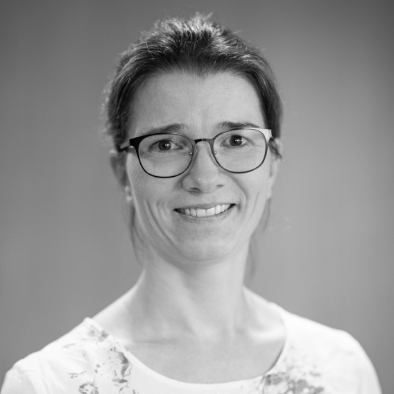
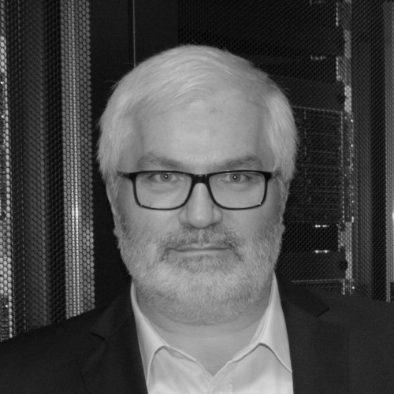
Contact
MS. ISABEL GRÄBNER
Conference Program Manager
MR. GEORG HAGER
Contributed Program Advisor

PROGRAM AT A GLANCE
The Invited Program Committee (IPC) ensures that all relevant topic areas in HPC systems and applications are addressed at ISC 2025.
Click on the image for a larger view


